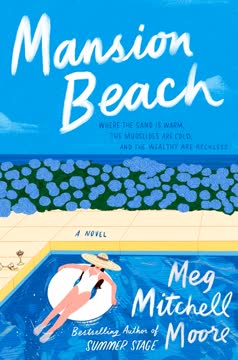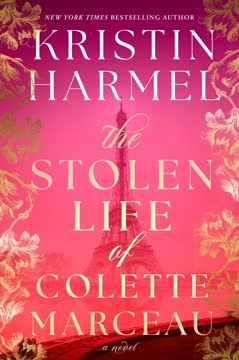Plot Summary
Summer's Unraveling Call
Betsy Whiting, a young graduate student in Manhattan, is swept from her sticky city routine by a desperate call from her mother, Virgie. The family's beloved Martha's Vineyard house is in financial peril after her father's death, and Virgie pleads for her daughters' help. Betsy, reeling from a breakup with her professor-lover Andy and a failed thesis, reluctantly returns home. The city's promise of independence is replaced by the suffocating closeness of her mother and sisters, and the looming threat of losing the only place that ever felt like home. The summer's first days are heavy with nostalgia, regret, and the unspoken fractures that have long divided the Whiting women.
Sisters Return, Secrets Await
Betsy's arrival at the Vineyard house reunites her with her older sisters, Louisa and Aggie. Old rivalries and wounds resurface: Louisa's perfectionism and past slights, Aggie's peacemaking and exhaustion as a young mother. The sisters circle each other warily, each carrying private grief over their father's death and the family's unraveling. Virgie, once a feminist icon, is now a mother on the edge, hiding the true extent of their financial crisis. The house, filled with memories and ghosts, becomes a crucible for the sisters' resentments and longing for connection.
Ghosts of Vineyard Past
Flashbacks to 1965 reveal Virgie's early summers on the Vineyard, her marriage to the charismatic but troubled Senator Charlie Whiting, and her struggle to balance ambition, motherhood, and a husband's betrayals. The island is both sanctuary and stage for the family's dramas. Virgie's feminist awakening is set against the backdrop of political ambition and marital strife, as she fights for her voice in a world that wants her silent. The past lingers in every room, shaping the present in ways her daughters can't yet see.
Virgie's Defiant Summer
Virgie's decision to bring her daughters to the island alone sparks conflict with Charlie and the local police, exposing the limits of her independence. Her "Dear Virgie" column, a lifeline for housewives, is canceled by Charlie to protect his political image. Virgie's anger and longing for self-determination simmer beneath her efforts to keep the family afloat. The summer becomes a battleground for her marriage, her career, and her daughters' futures, as she tries to teach them to be braver than she ever was.
Fathers, Lovers, and Loss
The sisters struggle with the loss of their father, each haunted by different memories and regrets. Betsy's heartbreak over Andy's rejection is compounded by her sense of failure and displacement. Louisa's old wounds with their father fester, while Aggie tries to hold everyone together. Virgie, overwhelmed by grief and guilt, clings to routines and projects, unable to admit how lost she feels. The house, once a symbol of family unity, now feels like a mausoleum of broken dreams.
The House Must Go
Virgie reveals the truth: the house must be sold to pay off debts Charlie left behind. The sisters are devastated, each mourning the loss in her own way. Betsy, especially, cannot imagine a future without the Vineyard. The family's only constant is slipping away, and with it, the last threads holding them together. The sisters hatch desperate plans to save the house, but the reality of their situation is inescapable. The threat of foreclosure looms, and the family's fractures widen.
Home Movies, Hidden Truths
Virgie gathers her daughters to watch home movies, hoping to rekindle their bond. The grainy footage reveals forgotten joys and hidden hurts, challenging the stories each sister tells herself about their parents and childhood. Betsy is forced to confront the gap between memory and reality, realizing her mother was more present than she believed. The sisters see themselves as children—innocent, loving, and already shaped by the family's complicated dynamics. The past is both comfort and curse, offering clues to the present's pain.
Old Friends, New Wounds
Betsy reconnects with James, her childhood friend and first love, now a history professor back on the island. Their easy intimacy is shadowed by years of distance and the disapproval of Betsy's late father. As Betsy navigates her feelings for James and the unresolved pain of her breakup, she is reminded of the possibilities and limitations of home. The sisters' efforts to save the house lead them to uncover more secrets, and Betsy's sense of belonging is tested by old wounds and new desires.
Flying Lessons and Fights
In a symbolic act of rebellion, Virgie arranges flying lessons for herself and her daughters, determined to show them that women can—and must—take risks. The experience is exhilarating and terrifying, forcing each woman to confront her fears and ambitions. The sisters' relationships are tested as they grapple with their mother's expectations and their own dreams. Virgie's past affair and Charlie's betrayals cast long shadows, and the family's future hangs in the balance.
The Price of Ambition
Louisa's legal career falters as she faces sexism and professional setbacks, while Aggie struggles to balance motherhood and her own aspirations. Betsy, adrift after her academic failure and Andy's abandonment, contemplates her future. The sisters' ambitions are shaped—and sometimes thwarted—by the legacy of their parents' choices. Virgie's memoir project becomes a lifeline, offering hope that their story can be reclaimed and rewritten. The cost of ambition, for each woman, is measured in love lost and found.
Letters, Lies, and Legacies
Sorting through their father's papers, the sisters discover a letter revealing a hidden property on Nantucket and hints of deeper betrayals. The revelation forces them to confront the myth of their perfect family and the reality of Charlie's double life. The sisters must decide whether to use this legacy to save their home, even as it threatens to upend everything they thought they knew about their parents—and themselves.
The Nantucket Revelation
Betsy and Louisa travel to Nantucket, uncovering the existence of Melody, their mother's former best friend, and Vera, their secret half-sister. The confrontation is raw and painful, exposing the full extent of Charlie's infidelity and the cost of silence. The sisters are forced to reckon with their parents' flaws and their own capacity for forgiveness. The discovery of the Nantucket house offers a possible solution to their financial woes, but at a steep emotional price.
Forgiveness and Fresh Starts
The sisters return to the Vineyard, forever changed by what they've learned. Old resentments are aired and, for the first time, truly heard. Betsy and Louisa find a new closeness, built on honesty and vulnerability. Virgie, too, confesses her regrets and the compromises she made to keep the family together. The family's wounds begin to heal, not by forgetting the past, but by accepting its complexity. The possibility of saving the house becomes a symbol of their renewed commitment to each other.
The Awakening of Betsy
Betsy discovers she is pregnant, the result of her failed relationship with Andy. Terrified and uncertain, she contemplates her options, ultimately choosing to keep the baby. For the first time, she confides in her sisters and mother, who rally around her with love and practical support. Betsy's decision marks her own awakening—a claim to agency and a future she chooses for herself. The family, once fractured, is remade by this act of courage and acceptance.
A Family Remade
With the sale of the Nantucket property and Virgie's book advance, the Whiting women secure their beloved Vineyard house. The sisters, now closer than ever, look to the future with hope and hard-won wisdom. Virgie's memoir promises to tell their story on her own terms, and Betsy prepares to become both a mother and a therapist, determined to help other women find their voices. The family's legacy is no longer one of secrets and silence, but of resilience, forgiveness, and the freedom to choose their own paths.
Characters
Betsy Whiting
Betsy is the heart of the novel—a sensitive, earnest woman caught between her mother's feminist legacy and her own longing for belonging. Her relationships—with her sisters, her late father, her ex-lover Andy, and childhood friend James—reveal her deep need for approval and fear of disappointing those she loves. Betsy's journey is one of self-discovery: from academic failure and heartbreak to the courage to choose single motherhood and a career as a therapist. Her arc is marked by vulnerability, resilience, and a growing capacity to forgive both herself and her family.
Virgie Whiting
Virgie is a complex matriarch: once a celebrated columnist and activist, now a widow struggling to hold her family together. Her marriage to Charlie is a study in compromise, ambition, and betrayal. Virgie's fierce independence and drive often clash with her daughters' needs, yet her love is undeniable. She is haunted by regrets—over her career, her marriage, and the ways she may have alienated her children. Through writing her memoir, Virgie seeks redemption and a new sense of purpose, ultimately modeling for her daughters the power of self-definition and forgiveness.
Louisa Whiting
Louisa is the family's overachiever—a brilliant lawyer whose ambition masks deep insecurities and old hurts. Her relationship with her father is fraught, shaped by a traumatic discovery of his infidelity and years of emotional distance. Louisa's professional setbacks and secret abortion reveal the cost of striving for perfection in a world that punishes ambitious women. Her journey toward vulnerability and reconciliation with her sisters is hard-won, marked by moments of anger, honesty, and, finally, acceptance of her own imperfections.
Aggie Whiting
Aggie is the glue of the Whiting family, always mediating conflicts and caring for others. As a mother of two, she struggles to balance her own desires—athletic ambition, personal fulfillment—with the demands of family life. Aggie's gentle wisdom and humor provide comfort to her sisters, even as she battles her own feelings of invisibility and exhaustion. Her decision to pursue her dreams, despite obstacles, inspires those around her and underscores the novel's theme of self-actualization.
Charlie Whiting
Charlie is both the family's anchor and its greatest source of pain. A beloved senator, he is charming, ambitious, and haunted by his orphaned past. His infidelities and financial mismanagement leave lasting scars on his wife and daughters. Yet, Charlie is not a villain—his love for his family is real, if imperfect, and his legacy is one of both inspiration and heartbreak. His secrets force the Whiting women to confront the truth about themselves and each other.
James Sunday
James is Betsy's first love and lifelong confidant, a boy from a troubled home who finds solace with the Whitings. His journey from island outsider to accomplished professor mirrors Betsy's own search for belonging. James's empathy, loyalty, and quiet strength offer Betsy a model of unconditional support. Their rekindled friendship—and the possibility of more—serves as a counterpoint to the family's history of abandonment and disappointment.
Melody Fleming
Melody is the catalyst for the novel's central revelation—a woman who, after a brief affair with Charlie, raises his secret daughter, Vera, on Nantucket. Her presence forces the Whiting women to confront the limits of forgiveness and the complexity of female friendship. Melody's choices are shaped by loneliness, longing, and the desire to protect her child, even at great personal cost.
Vera Fleming
Vera is the living embodiment of Charlie's betrayal and the family's capacity for both harm and healing. Though she appears only briefly, her existence challenges the Whiting sisters to expand their understanding of family and to reckon with the consequences of silence and shame.
Andy Pines
Andy is the professor who seduces and abandons Betsy, failing her both academically and emotionally. His rejection and denial of responsibility for Betsy's pregnancy crystallize her sense of isolation and ultimately propel her toward self-reliance. Andy represents the limitations of traditional male support and the necessity of women forging their own paths.
Pamela Sunday
Pamela is a minor but poignant figure—a single mother battling addiction and poverty, whose struggles mirror the novel's themes of resilience and the need for community. Her relationship with Virgie and the Whitings highlights the importance of compassion and the ways in which women support one another across class and circumstance.
Plot Devices
Dual Timelines and Intergenerational Echoes
The novel's structure alternates between the late 1970s and the mid-1960s, revealing how the choices and traumas of one generation reverberate through the next. Flashbacks to Virgie's youth and marriage provide context for the sisters' present-day struggles, while home movies, letters, and family stories serve as bridges between eras. This device deepens the emotional resonance, allowing readers to see the roots of the family's dysfunction and the possibility of healing.
Secrets, Letters, and Unspoken Truths
The discovery of Charlie's secret property, Melody's existence, and the revelation of Vera as a half-sister are all propelled by the uncovering of letters, legal documents, and long-buried memories. The motif of secrecy—what is said, what is withheld—underscores the novel's exploration of shame, loyalty, and the cost of silence. The gradual unveiling of these truths forces the characters to confront their own complicity and to choose between denial and growth.
Symbolic Settings and Objects
The Vineyard house is more than a backdrop—it is a character in its own right, symbolizing safety, memory, and the fragility of home. The sea, with its tides and storms, mirrors the family's emotional turbulence and the possibility of renewal. Objects like home movies, the sailboat Senatorial, and the book The Awakening serve as touchstones for the characters' journeys, anchoring their search for meaning and belonging.
Feminist Awakening and Generational Change
Virgie's feminist activism and the sisters' struggles with sexism, ambition, and motherhood are woven throughout the narrative. The book club, flying lessons, and career setbacks all serve as catalysts for the women's self-discovery. The novel uses these plot devices to interrogate what it means to be a woman—then and now—and to suggest that true liberation comes from the freedom to choose one's own path, even when it defies expectations.
Reconciliation and the Power of Storytelling
The act of writing—Virgie's memoir, Betsy's thesis, the sisters' letters—becomes a means of reclaiming agency and forging connection. Storytelling is both a way to make sense of the past and to imagine a different future. The novel's resolution hinges on the characters' willingness to share their truths, forgive each other, and co-author a new family narrative.
Analysis
Brooke Lea Foster's Our Last Vineyard Summer is a luminous exploration of family, memory, and the evolving meaning of home. Through the lens of the Whiting women—each wrestling with the legacies of love, betrayal, and ambition—the novel interrogates the costs and rewards of forging an authentic life. The dual timelines reveal how the past is never truly past, and how the secrets we keep can both protect and poison those we love. Foster's narrative is a meditation on the complexities of female identity: the tension between independence and belonging, the burden of perfection, and the necessity of forgiveness. The Vineyard house, threatened by loss, becomes a crucible for transformation—a place where old wounds are exposed and, ultimately, healed. The novel's feminist undercurrent is both subtle and profound, suggesting that true empowerment lies not in grand gestures, but in the daily acts of choosing, loving, and telling one's story. In the end, Our Last Vineyard Summer is a testament to the resilience of women, the redemptive power of truth, and the enduring hope that, even after the hardest seasons, we can find our way home.
Last updated:
Review Summary
Our Last Vineyard Summer is a compelling family saga set on Martha's Vineyard, exploring themes of feminism, sisterhood, and generational secrets. The dual-timeline narrative follows the Whiting family in 1965 and 1978, focusing on matriarch Virgie and her daughter Betsy. Readers praised Foster's rich character development, atmospheric setting, and exploration of women's rights issues. While some found the pacing slow at times, many appreciated the nuanced portrayal of mother-daughter relationships and the book's emotional resonance. Overall, it's considered a thoughtful summer read with depth and heart.
Similar Books
Download PDF
Download EPUB
.epub digital book format is ideal for reading ebooks on phones, tablets, and e-readers.















